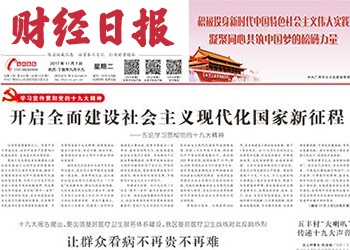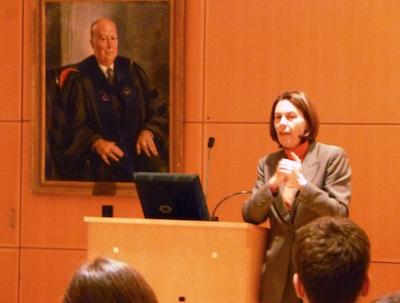普林斯顿大学教授:美持续经济增长倚仗于美联储的独立地位商业

2018年对于全球经济来说十分不平凡,这是很多人眼中艰难的一年。全球经济局势景气不足,国际局势扑朔迷离,地缘政治局势复杂、全球去杠杆进程如火如荼、贸易谈判徘徊不前…
2019已经到来,很多2018年我们面临的困难并未解决。我们应该如何适应新的一年?如何在扑朔迷离的经济环境中寻找新的增长和方向?金融界特邀与您一起探路2019,问道未来!
本期嘉宾:普林斯顿大学经济学院教授Elizabeth Bogan
金融界:世界主要经济体的货币政策似乎正在趋向宽松,主席鲍威尔暗示最近美联储会议将降息。回顾历史,开放降息周期通常意味着金融危机的开始。这次会是这种情况吗?
Elizabeth C. Bogan:我不认为美联储考虑降低联邦基金目标利率意味着金融危机即将到来。相反,美联储正谨慎地试图保持长期扩张。由于我们现在不存在通货膨胀的问题,美联储会在需要时通过降息刺激经济。
在过去,降息周期通常意味着经济已经走弱,美联储试图通过刺激借贷来抑制经济衰退。反周期货币政策在西方国家至关重要,因为自由市场会陷入时而过于乐观时而过于悲观的周期。虽然我强调银行依赖其贷款客户保证经济增长,但金融市场将会扩张并且可能发生金融危机,私营部门将会过于悲观并囤积资金。为了限制经济衰退,中央银行必须增加资金,以便人们可以在不进一步削减消费和投资支出的情况下持有资金。
创新浪潮和个人激励是增长的核心动力
金融界:美国经济在特朗普政府期间保持了强劲的增长势头。您认为美国经济增长的核心动力是什么?
Elizabeth C. Bogan:我将美国保持经济增长归因于创新浪潮,而创新浪潮又得到了自由社会的鼓励。自由社会意味着从一开始就强调公共教育和多元化移民,这使新的思维方式不断被创造。除此以外,美国银行向任何他们认为可以获得贷款回报的人提供贷款,经济效率推动了经济增长。需要补充的是,这里的传统主要是向公司而不是州和地方政府提供贷款。同时,私营部门在蓬勃发展。
目前的增长主要来自2017年12月的税收变化。降税和让公司收回海外利润激励了美国的商业投资,宽松监管也有所帮助(并非改变具体规则,而是使人坚信政府不会发布新规)。公司和个人在投入新资金时必须考虑未来的政治和经济环境。
持续经济增长倚仗于美联储独立地位
金融界:在未来十年,美国能否依靠其目前的核心增长动力保持其在世界上的领先地位?
Elizabeth C. Bogan:未来十年的某个时候将会出现衰退。但是,只要我们的政府不试图过度引导资本或过度征税,美国经济增长就可能再次发生。
我担心特朗普总统对货币政策的一些评论。我们需要美联储保持独立,继续发挥反周期货币政策的作用,通过扩张性货币政策来应对经济衰退,并控制增长来防止通胀超过2%。美国需要保持独立,即在经济衰退期间,它将未偿还的政府债务货币化,但并不指定哪些公司获得贷款。公司应该自由追求利润(在促进公平和诚实行为的正常法律范围内),而政府不应该选择谁获得资金。
美国犯了错误,尽管如此,其民主自由和个人激励已经很好地发挥了作用。我希望在将来这样正面的作用能够持续,但同时也担心如果部分民主党掌权,增长将受到影响。
如何激励私企、平衡公营私营部门是关注重点
金融界:目前全球经济增速都有所放缓,为了应对这种情况,各国政府都使用了一系列刺激措施。中国政府在去产能、去杠杆、拉动需求和经济结构调整上进行了充分的布局,您认为,应对全球经济增速动力不足的现状,政府层面应如何应对?
Elizabeth C. Bogan:改革开放激励中国企业家创造了令人惊叹的,连续几十年10%的经济增长。目前中国的经济情况可能只是放缓了它成为世界领导者的脚步,但并不会影响中国的发展和进步。我不是中国政府政策的专家,所以并不适合发表评论,只能从较为个人角度简单谈一谈自己的想法。
正如我们所了解的,美国现在正给予企业最大的减税政策,中国也在2018年的税制改革中也采取了同样的举措。我建议中国方面可多关注私营部门利润、减税成效和平衡国有与私营企业关系的议题。
以下为访谈全文:
1. Monetary policy in the world’s major economies seems to be loosening, and Federal Reserve Chairman Powell hinted at an interest rate decrease at a recent Federal Reserve meeting. Looking back on history, opening the interest rate reduction cycle generally means the beginning of the financial crisis. Would that be the scenario this time?
I do not view the Fed’s consideration of reducing the Fed Funds Target Rate to signal a coming financial crisis. Rather the Fed is cautiously trying to keep the long expansion going. Since we do not have a problem now with inflation, the Fed can afford to stimulate the economy if needed.
In the past the interest rate reduction cycle has often meant that the economy had already turned down and the Fed was trying to limit the depth of the recession by stimulating borrowing. Counter-cyclical monetary policy is essential in a capitalistic country, because periodically free markets get too optimistic and then too pessimistic. While I emphasize below the importance of banks deciding on their loan customers for economic growth, it is nevertheless true that financial markets will get over extended and a financial crisis can occur. Then the private sector is too pessimistic and hoards money. To limit the recession, money must be added by the Central Bank so people can hold it without further cutting spending on consumption and investment.
2. The U. S. economy has maintained a strong growth momentum during the Trump Administration. What do you think is the core driving force of U. S. economic growth?
The U. S. has had a very long-term trend of good growth. I attribute that to waves of innovation, which in turn were encouraged by a free society with an emphasis from its beginning on public education and with immigration from around the world, so that new ways of thinking were often introduced. Freedom meant that people who made strong economic contributions were rewarded with high income, so incentives to innovate have been strong. In addition, U. S. banks lend to whomever they think will make a return on the loan. The government does not get involved in picking who gets the loans. Economic efficiency drives growth. Also, the tradition of banking here is to lend mostly to companies rather than to state and local governments. The private sector flourishes.
The current growth is largely from the tax changes of December 2017. Cutting the corporate tax rate and letting companies repatriate overseas profits without heavy taxes encouraged business investment in the U. S. Deregulation also helped (not so much by the specific rules that were changed but by the belief that the Government would not put in new regulations). Companies and individuals have to think about the future political and economic environment when they commit new money.
In the next decade, will the United States be able to maintain its leading position in the world by relying on its current core growth power?
Sometime in the next decade there will be a recession. But the reoccurrence of growth in the U. S. is likely so long as our government does not try to direct capital or tax it too heavily (as some Democrats wish to do). It is also important that the U. S. allows individuals with high human capital to immigrate to the U. S., so that innovation remains strong.
I worry about some of President Trump’s comments on monetary policy. We need the Federal Reserve to remain independent to continue the role of counter-cyclical monetary policy to counter-act recessions with expansionary monetary policy and to tighten in booms to prevent inflation above 2%. The U. S. needs to continue the independent role for the Central Bank that in a recession it monetizes outstanding government debt, but does not direct which firms get loans. The firms should be free to pursue profits (within normal laws promoting fair and honest behaviors). The government should not choose who gets the funds.
All countries make mistakes and the U. S. is no exception. Nevertheless, its democratic freedoms and private incentives to succeed have served it well and I hope will continue to do so in the future. I do worry if some of the left-wing Democrats gain political control that growth will suffer.
3. China’s economic growth is slowing down. In order to cope with this situation, the Chinese government has taken a number of measures. Including the removal of capacity and leverage to enhance domestic demand and economic restructuring. At present, are the government’s measures effective?
As you know, the Deng reforms increased private incentives and inspired Chinese entrepreneurs to create an awesome growth pattern for decades of near 10% growth. Slowing down a bit may just be that growth oortunities were stronger catching up than they can be as a world leader.
Since I am not an expert on Chinese government policy, I am not comfortable commenting on current policies.
本网站转载文章仅为传播更多信息之目的,凡在本网站出现的信息,均仅供参考。本网站将尽力确保所提供信息的准确性及可靠性,但不保证信息的正确性和完整性,且不对因信息的不正确或遗漏导致的任何损失或损害承担责任。











